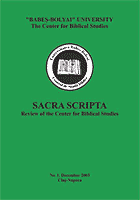Historiographic Views on the Settlement of the Jewish Tribes in Canaan
Historiographic Views on the Settlement of the Jewish Tribes in Canaan
Author(s): Ladislau GyémántSubject(s): Christian Theology and Religion
Published by: Universitatea Babes-Bolyai - Centrul de Studii Biblice
Summary/Abstract: The settlement of the twelve Jewish tribes in Canaan - the Promised Land - is an essential landmark in the ancient history of the birth of this people. What we know for sure is that in 1229 B.C.E., when pharaoh Merneptah, Ramses II's son, mentioned in his famous stele the so-called Israilou among the peoples the Egyptians defeated in the land of Canaan, the people of Israel entered the stage of history following a route that written and unwritten (chiefly archeological) sources are more and more clearly revealing. How these tribes succeeded in conquering this country has been and still is the object of dispute in historical writing and this is the topic that we would like to deal with in the following pages. The classic debate was focused on the controversy between those who totally or in broad lines accepted the Old Testament version on the conquest of Canaan by the Israelite tribes and those who rejected the theory. The so-called Baltimore School, whose major representative was W. F. Albright, the editor of the prestigious "Bulletin of American Schools of Oriental Research", believed that the settlement of the Jewish tribes in Canaan depicted in the Old Testament corresponded to the historical truth, also substantiated by the archeological discoveries in the area. According to this opinion, the conquest of Canaan took place during one campaign, under Joshua's leadership, either through Trans-Jordan, going round the land of Edom and passing through the territory inhabited by the Amorites, or crossing the land of the Edomites and Moabites to Jericho, Ai, Gabaon and Lake Merom, where the coalitions of the kings of the Canaanite city-states were defeated one by one . In opposition to this viewpoint, the historiographic school founded by Albrecht Alt and Martin Noth believed that the Old Testament tradition was a late fiction dating from the middle of the 1st millennium B.C.E. and deemed that there was no military conquest of Canaan, but a gradual penetration and settlement of nomad tribes of shepherds, who would subsequently make up unions of tribes held together by their monotheistic belief. Both the aforementioned schools started from the basic idea that the Jewish tribes came from without Canaan and settled there either following a military conquest, or gradually and peacefully penetrating the territory in a longer span of time. After 1962, another perspective emerged, according to which the birth of the Jewish people was an internal process of the local Canaanite society, with or without the contribution of outside groups, who did or did not bring with them the monotheistic belief antagonistic to the polytheism of the city-states of Canaan. The first to sketch such a viewpoint was G. E. Mendenhall, who believed that the nomad pastoral tribes that made up the Israilou were in fact just transhumant, opposed to the urbanized Canaanite society, and that they rebelled against the centralized authoritarian system at a certain moment.
Journal: Sacra Scripta
- Issue Year: I/2003
- Issue No: 1
- Page Range: 26-30
- Page Count: 5
- Language: English
- Content File-PDF

